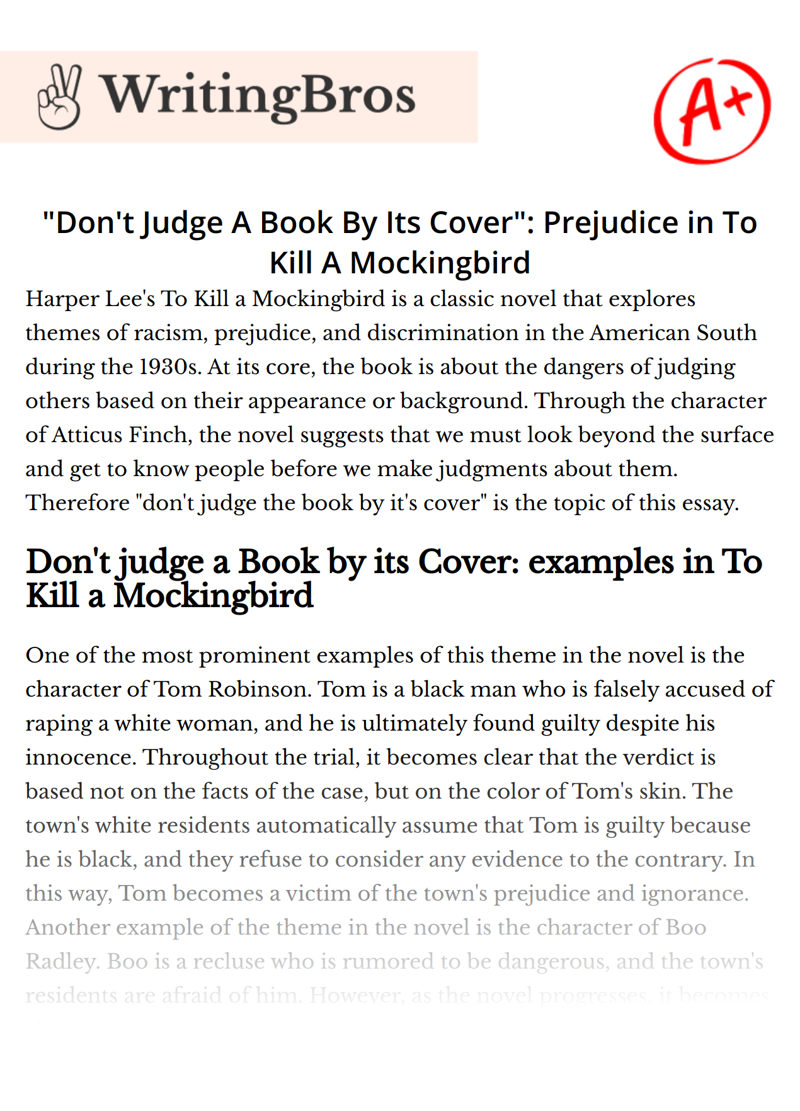"Don't Judge A Book By Its Cover": Prejudice in To Kill A Mockingbird

Harper Lee's To Kill a Mockingbird is a classic novel that explores themes of racism, prejudice, and discrimination in the American South during the 1930s. At its core, the book is about the dangers of judging others based on their appearance or background. Through the character of Atticus Finch, the novel suggests that we must look beyond the surface and get to know people before we make judgments about them. Therefore "don't judge the book by it's cover" is the topic of this essay.
Don't judge a Book by its Cover: examples in To Kill a Mockingbird
One of the most prominent examples of this theme in the novel is the character of Tom Robinson. Tom is a black man who is falsely accused of raping a white woman, and he is ultimately found guilty despite his innocence. Throughout the trial, it becomes clear that the verdict is based not on the facts of the case, but on the color of Tom's skin. The town's white residents automatically assume that Tom is guilty because he is black, and they refuse to consider any evidence to the contrary. In this way, Tom becomes a victim of the town's prejudice and ignorance.
Another example of the theme in the novel is the character of Boo Radley. Boo is a recluse who is rumored to be dangerous, and the town's residents are afraid of him. However, as the novel progresses, it becomes clear that Boo is not the monster that people make him out to be. Instead, he is a kind and caring person who has been misunderstood by the town's residents. By the end of the novel, Scout comes to understand that judging Boo based on his appearance and reputation was a mistake, and that he is actually a good person.
Atticus Finch is the character who embodies the theme of "don't judge a book by its cover" most strongly in the novel. Atticus is a respected lawyer who defends Tom Robinson in court, even though he knows that the odds are against them. Atticus believes that everyone deserves a fair trial, regardless of their race, and he does his best to defend Tom to the best of his abilities. Through his actions, Atticus shows that it is important to look beyond the surface and to treat people with respect and dignity, regardless of their background.
However, even Atticus is not immune to the prejudices of the town. Despite his best efforts, he is unable to prevent Tom from being convicted, and he is subjected to harassment and threats from some of the town's residents as a result of his defense of Tom. This shows that even the most enlightened and compassionate person can be affected by the prejudices of the society in which they live.
Throughout the novel, the theme of "don't judge a book by its cover" is reinforced by the experiences of the characters. Tom Robinson, Boo Radley, and even Atticus Finch are all judged by others based on their appearance or background, and they suffer as a result. The novel suggests that we must look beyond the surface and get to know people before we make judgments about them, and that we must be willing to challenge the prejudices and biases that are present in our society.
The theme of "don't judge a book by its cover" is particularly relevant in today's society, where people are often judged based on their appearance, race, gender, or other superficial characteristics. The novel reminds us that we must look beyond the surface and get to know people before we make judgments about them, and that we must be willing to challenge the prejudices and biases that are present in our society.
In conclusion, Harper Lee's To Kill a Mockingbird is a powerful novel that explores themes of prejudice, discrimination, and racism in the American South. Through the characters of Tom Robinson, Boo Radley, and Atticus Finch, the novel suggests that we must look beyond the surface and get to know people before we make judgments about them. The novel reminds us of the importance of treating everyone with respect and dignity.
References
- Lee, H. (1960). To kill a mockingbird. Philadelphia: J.B. Lippincott.
- Jolley, D. (2006). Re-reading to kill a mockingbird. The English Journal, 96(3), 51-57.
- Johnson, C. L. (2003). To kill a mockingbird: Threatening boundaries. Mississippi Quarterly, 56(3), 389-402.
- Shaffer, B. W. (2011). "Shoot all the bluejays you want, if you can hit 'em, but remember it's a sin to kill a mockingbird": The power of literature in enhancing students' empathy. Journal of Adolescent & Adult Literacy, 55(4), 281-290.
- Horvath, B. (2016). Teaching to kill a mockingbird through the lens of critical race theory. The Journal of Negro Education, 85(3), 231-244.
- Lipson, C. (2012). ‘‘Real courage’’: Atticus Finch and the legal profession. Journal of Legal Education, 62(2), 287-294.
- Lubet, S. (2010). Reconstructing Atticus Finch. Michigan Law Review, 108(8), 1171-1180.
- Eldredge, A. S. (2003). The point of it all: The ambiguous ending of To Kill a Mockingbird. The Southern Quarterly, 40(4), 126-134.
Cite this Essay
To export a reference to this article please select a referencing style below

